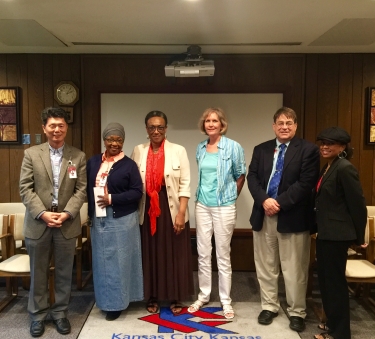
by Kelly Rogge
Two faculty members at Kansas City Kansas Community College have been recognized for their assessment efforts in the classroom – Karen Gaines, instructor of business and coordinator for the marketing-mid-management program and D.C. Broil, director of the forensics lab.
“The award is designed to promote best practices in assessment, to encourage faculty participation in assessment and to recognize and reward outstanding faculty for their assessment practices at the classroom, program and campus-wide levels,” said Karisse Whyte, student learning outcomes and assessment (SLOA) work group leader. “This award has been an implementation goal of faculty in the SLOA Work Group since its establishment over four years ago.”
The focus for the 2015 Faculty Assessment Award and the upcoming 2016 award is use of rubrics. Rubric submissions are scored based on the following criteria:
• Alignment with the outcome
• Scope, depth and difficulty of the assignment for which the rubric was utilized.
• Clarity of expectations
• Guidance to learners
• Clarity of the rubric criteria
• Distinction between the rubric levels.
Faculty must also submit a review and analysis of their results and data, along with sample student artifacts. The names of submitters for the awards are removed and members of the Student Learning Outcomes and Assessment Work Group score all entries. The two highest score earners receive first and second place awards.
“One goal in teaching a course is to build a community, in each class, of support. Support includes strategies to understand problem solving and methods used to apply concepts. The history of how scientific concepts were developed by scientist and how their everyday life affected the outcome of the scientific concept goes a long way in preparing students to remember,” said Broil, who received the second place award. “I am a big proponent of the Socratic method. A question that directs and stimulates thought goes further toward understanding than simply memorizing. The assessment tool I submitted for this award incorporates the course objectives from our syllabi into the laboratory activities. This connection allows the student to not only read the textbook concept and complete calculations, but to see the concept in the lab, understand how and why measurements are required to solve a problem of study.”
Gaines said assessment is important on many levels.
“From a faculty perspective, it provides a more uniform method of evaluating student performance against established criteria and from a student perspective, it offers more concrete feedback on their work product,” she said. “It also provides a quantifiable foundation on how their grade was calculated.”
Broil said when she learned she had received the award, she felt like she was teaching at a college with a high interest in teaching and graduating students with knowledge. She said knowledge always “increases ones choices in life.”
“Assessment gives the student better understanding of how they learn,” she said. “It allows better development of study methods, and the student obtains foundational knowledge to build upon. My goal with assessment is to ensure the student knows the essence of the course.”
Individual winners can receive $1,000 for first place and $500 for second place, while groups can receive a $1,000 or $2,000 award. The Assessment Awards are funded by the office of the vice president for academic affairs and student services, with the approval of the Board or Trustees.
“Having a cash award associated with the assessment award is a generous gesture on the part of the college. However, knowing that my peers chose my assessment is really my reward. The money was just like icing on the cake,” said Gaines, who received a first place award. “Our students are our customers, and as a faculty member, I am here to help them – in my own way – to achieve their goals and be successful. Student success is our focus at KCKCC. Whether we are young or old, it’s human nature to want to do the best we can and be recognized for our achievements.”
Whyte said through the Assessment Award program, faculty have the opportunity to highlight effective practices in the classroom and to learn from one another.
“The higher purpose of the Assessment Awards is to promote the ongoing evaluation and improvement of student learning here at KCKCC,” she said. “Implementation of effective teaching, learning, and assessment practices and processes ultimately leads to higher success rates for our students.”
Kelly Rogge is the public information supervisor at Kansas City Kansas Community College.
